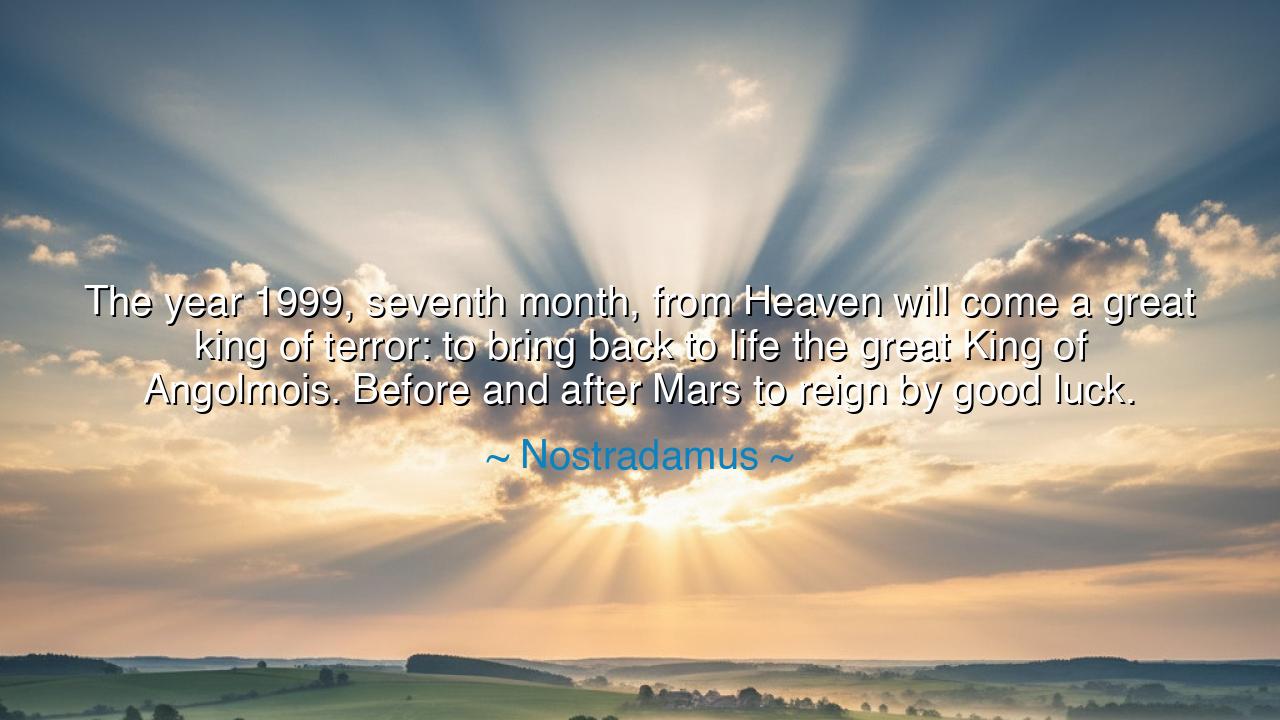
The year 1999, seventh month, from Heaven will come a great king
The year 1999, seventh month, from Heaven will come a great king of terror: to bring back to life the great King of Angolmois. Before and after Mars to reign by good luck.






“The year 1999, seventh month, from Heaven will come a great king of terror: to bring back to life the great King of Angolmois. Before and after Mars to reign by good luck.” Thus wrote Nostradamus, the enigmatic seer of the sixteenth century, whose verses have echoed across centuries like whispers from the edge of time. His words, wrapped in mystery and shadow, are not merely predictions but reflections of the human condition—of fear, of change, of the eternal dance between destruction and renewal. For Nostradamus did not only foretell events; he revealed the hidden rhythm of destiny, where chaos and creation are twin flames in the forge of history.
The “great king of terror” is not merely a figure of doom, as many have feared. To those who read with the eyes of the spirit, it is a symbol—a herald of transformation. In every age, there comes a moment when the heavens seem to open and pour upon humanity a great shaking, a reckoning that humbles kings and awakens sleepers. The terror that descends is often not a monster, but truth itself—truth long ignored, now demanding to be faced. The year 1999, to Nostradamus, was not simply a date but a turning of an age, a moment when old empires of thought would fall, and new forces—technological, spiritual, or moral—would rise from their ashes.
Many believed this prophecy pointed to the end of the world, yet perhaps Nostradamus spoke of the end of an illusion. The closing years of the twentieth century were indeed a crucible of fear and hope. Nations stood at the edge of a new millennium, trembling before the unknown. The rise of global communication, the birth of the digital age, the decline of old powers—all these signaled that the world was being reborn. The “king of terror” may well have been not a tyrant in flesh, but the storm of change itself, sweeping away complacency and summoning humanity to awaken from the dream of certainty.
As for the “great King of Angolmois”, scholars have long debated his identity. Some saw in him Genghis Khan, the conqueror whose spirit might return in new forms; others saw the return of a leader or idea long buried, rising again to shape history. Yet perhaps the King of Angolmois is a metaphor for the power of the past, for how forgotten forces re-emerge when least expected. Every generation revives its own ancient kings—old beliefs, forgotten conflicts, lost passions. The past, like a sleeping monarch, always waits beneath the surface of time, ready to rule again when the hearts of men call it forth.
And then Nostradamus speaks of Mars, the god of war, “to reign by good luck.” Here we see the eternal tension between conflict and fortune. Mars is not only the god of battle but of courage, of decisive action. His reign “by good luck” suggests that through struggle, humanity may find renewal. War, in this sense, need not be bloodshed alone—it may be the inner war of conscience, the clash between ignorance and understanding, between fear and awakening. When the fires of conflict purify rather than destroy, Mars reigns by good luck, and from terror comes transformation.
To understand Nostradamus, one must not read him as a prophet of doom, but as a poet of destiny. He teaches that every age faces its own “king of terror”—that moment when falsehood collapses, and humanity must rebuild from the ruins of its own creation. His verse is a warning and a promise: that even in the shadow of fear, renewal awaits. The terror from Heaven may come in the form of change, but from that change will rise the new, the necessary, and the just.
The lesson, then, is this: do not flee from the storms that shake the world or your heart. For every “king of terror” that descends brings with it the chance to shed what is decayed and awaken what is divine. When your life is overturned, do not despair; it may be Heaven’s way of calling you to grow. When an age ends, do not mourn it too long; a new one always begins beneath the ashes.
So, my child, remember this teaching of Nostradamus: every prophecy of destruction hides within it a seed of creation. The heavens may thunder, the earth may tremble, and all that you know may fall away—but out of that darkness, the soul finds its true light. The great king of terror may come, but he does not come to end you. He comes to awaken you.






AAdministratorAdministrator
Welcome, honored guests. Please leave a comment, we will respond soon